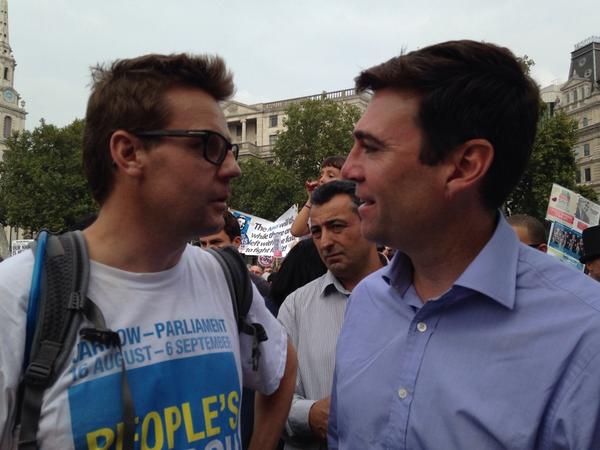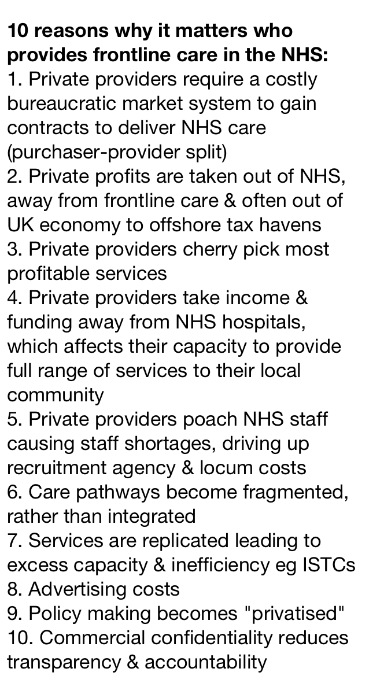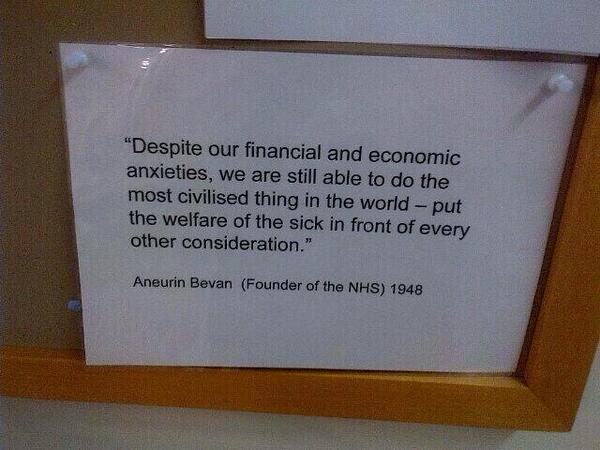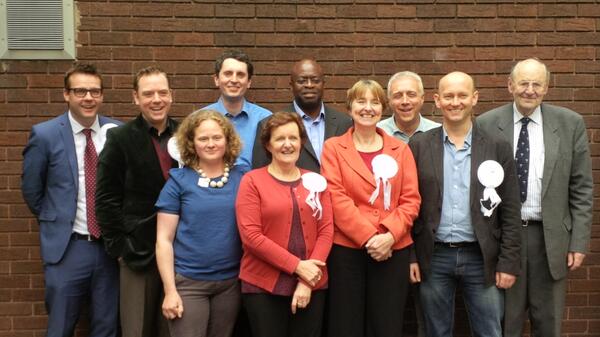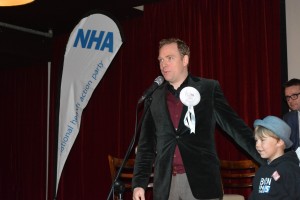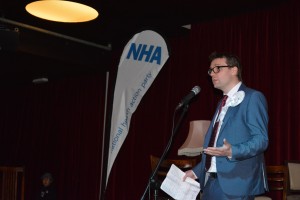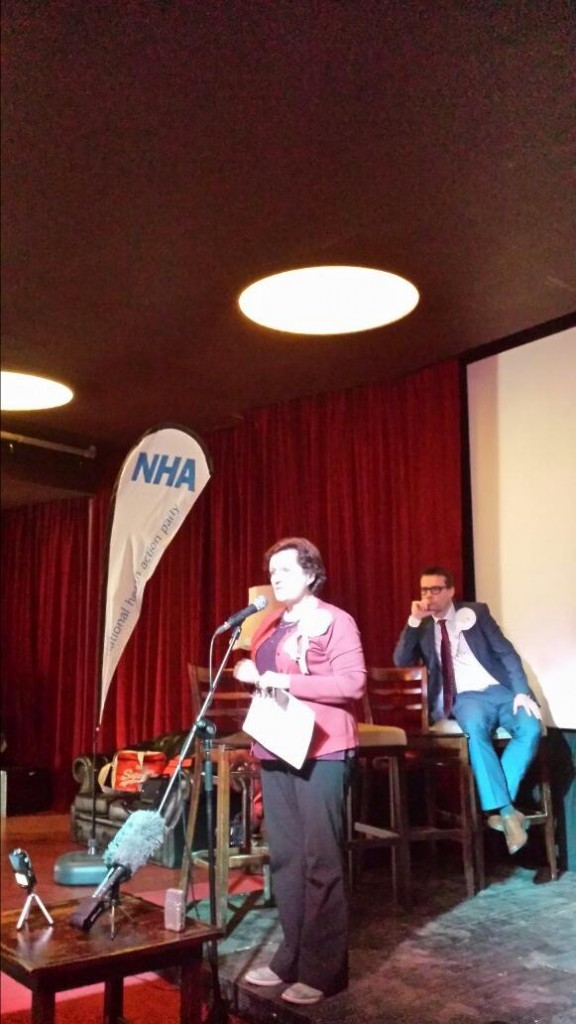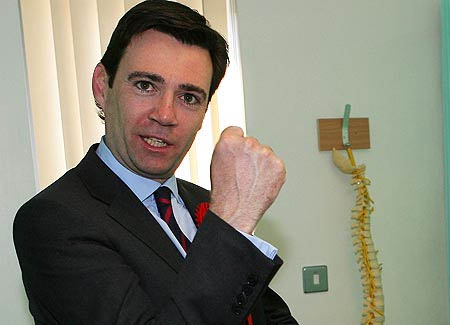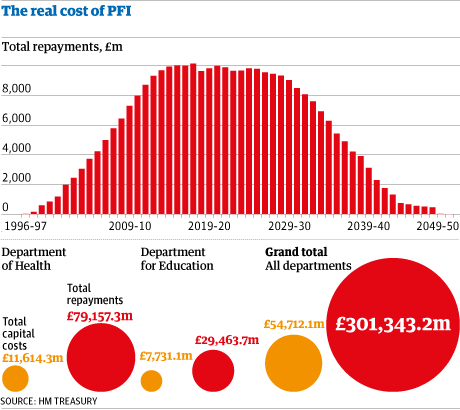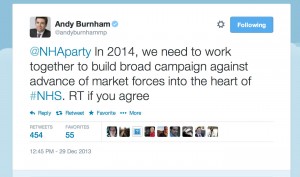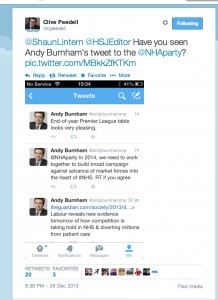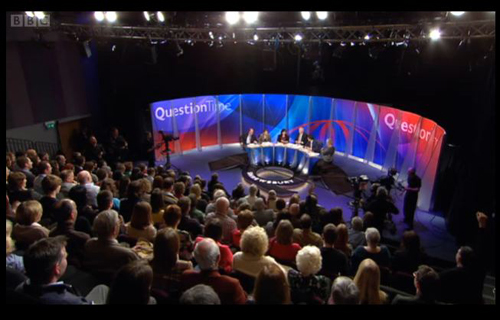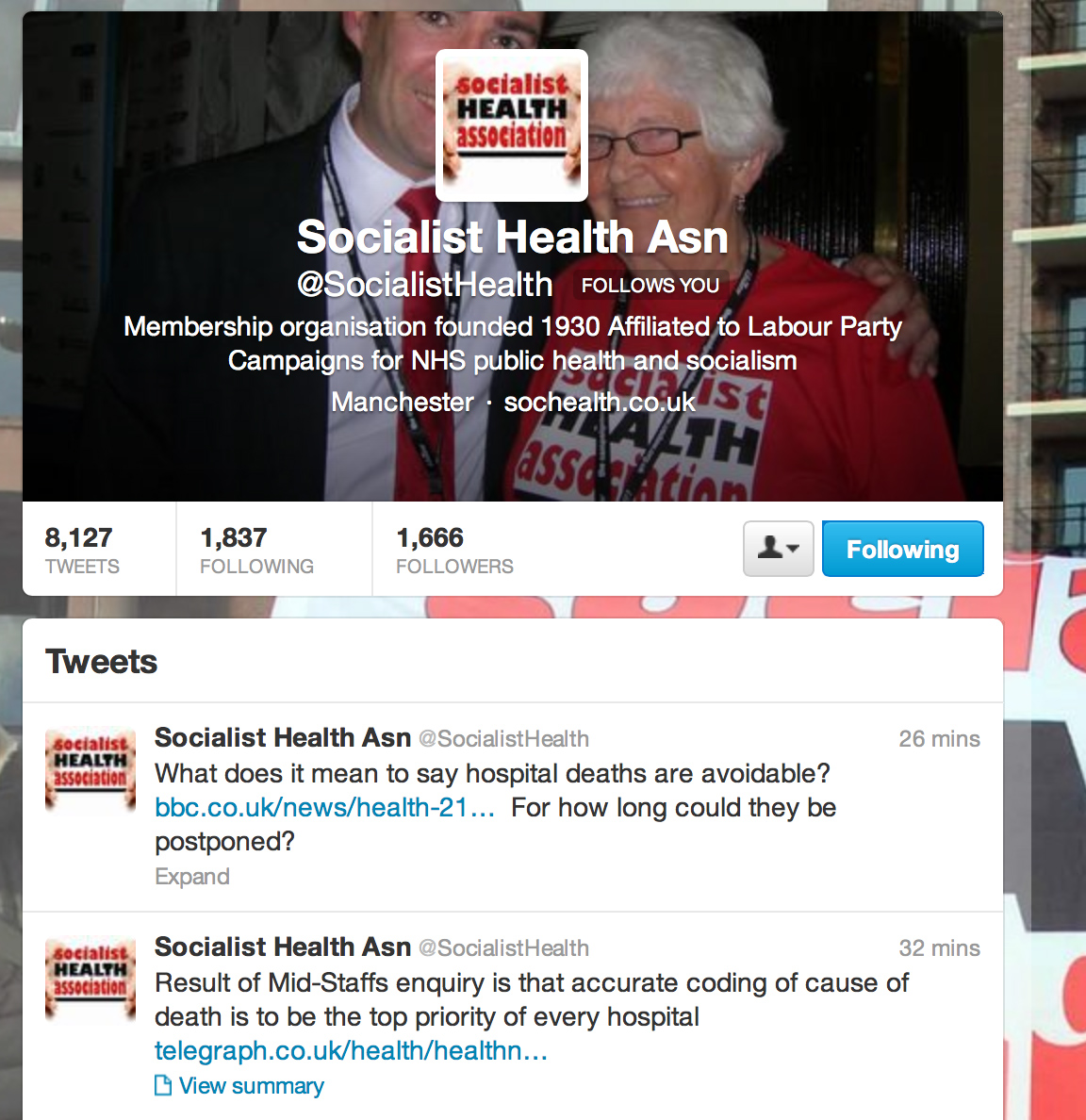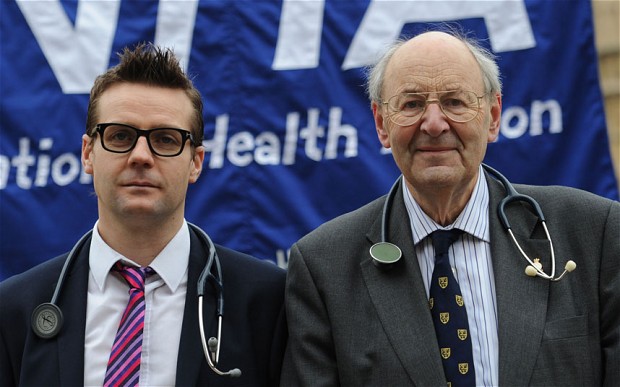Home » NHS Action Party
What is Clive telling Andy and does Andy need to listen?
I had the pleasure of going to two events at the weekend. On Saturday, I went to the event at Trafalgar Square for the #999CallfortheNHS #DarloMums arriving after their 300 mile-long walk across the country. Thanks to Jos Bell for inviting me, for which I am deeply grateful. The following day, I went to the National Health Action Party for their Annual Conference in Conway Hall, Red Lion Square, London. I enjoyed that afternoon as well.
The National Health Action Party are putting up parliamentary candidates for the General Election 2015, the vast majority of whom are known friends of mine. I am proud of them, and I really do wish them well. They give people a chance to vote for a party which has an established position against privatisation. The party is led by Dr Clive Peedell and Dr Richard Taylor, and they clearly have a strong position against privatisation of the NHS, and various manifestations of the NHS market including the private finance initiative and the EU-US free trade treaty.
They have made substantial progress this year. One of their challenges as a new party is having people recognise what they stand for, and this is clearly going to be hampered if the mainstream media do not give them a fair opportunity. Nonetheless, there have been noteworthy successes, such as appearances on Sky, LBC and “The Evening Standard”. And there is no doubt about the intensity of emotion in support of the National Health Service. A challenge is funding, and, whilst the party is in fact running a healthy surplus, having more funds will allow them to present a greater number of election candidates; an inevitably costly process.
It was very nice to chat with Dr Clive Peedell both before and after the event. I understand the misgivings about previous Labour policy, and indeed whether Labour can be said to be doing enough on abolishing the market. There are clearly strands of Labour policy which made room for private providers, but likewise it is also the case that the Lewisham judgment in the high court clearly stated that legislation under the present Government had been a clear departure from previous law under the last Labour government.
So it is not a surprise that many of the key pledges of the National Health Action Party will also be of concerns of some Labour voters with a keen interest in NHS policy. A slide of these were presented yesterday.
It is easy to underestimate the pernicious effect that the private finance initiative has had. Whilst it may have had good intentions of improving the infrastructure of the health service, one cannot deny how ‘cost savings’ allegedly in places have led to dangerous threats to patient safety, such as hospital infection, or in actual staffing numbers cannot be tolerated, not least by the general public and the clinical regulators. Whilst not all the problems can be held responsible from that desk behind Whitehall, the removal of the Secretary of State’s duty for the NHS is clearly symbolic. And Clive Efford MP perhaps would do well to learn from Peter Roderick, a public interest lawyer by training, and Prof Allyson Pollock, a world respected expert in public health.
Andy Burnham MP undoubtedly has a lot of goodwill too, and it is now likely that Labour will be the largest party of an incoming government at least under the leadership of Ed Miliband; they could win an outright majority, also, if the policy mix is right. Burnham has explicitly stated his desire to repeal the Health and Social Care Act (2012), but it is clear that a huge amount of work will be necessary to clear up the regimes for Trusts in financial distress, and for getting rid of competitive tendering tendering as being the default option.
It is not easy to let the Liberal Democrats ‘off the hook’, though it is clear that there are MPs such as Andrew George who have been strongly critical of the NHS reforms and indeed the “Bedroom Tax”. It is undoubtedly clear that the National Health Action Party will not be the main party forming Government next year, but they have never had aspirations to. They do allow the main political parties to be held to account, and their supporters are enthusiastic and well informed.
One of the critical tests for Labour will be letting go of the more neoliberal twangs to its policy, and to represent those people who had gone on the modern day NHS Jarrow march. It is not simply good enough to riposte every attack with ‘yeah but the NHS is free at the point of need’. There are genuine problems with solidarity, equity, justice, and comprehensiveness in current ethos, and a whole raft of problems which have arisen from indisputable marketisation and privatisation of the National Health Service.
It would be a mistake for Labour to discount the National Health Action Party as an insignificant blot on the landscape, when many of their concerns should be genuine concerns for Labour too. Andy Burnham is a highly skilled politician, but he has a strong vested interest in making a Labour government work properly for the NHS, and that might include for example not holding its staff to ransom yet again on a pay freeze. Andy as critical part of a Labour Government might wish to find a way to fund the NHS properly, especially since the economy is apparently making a recovery?
Whilst the present Coalition Government may seem ‘catastrophic’ to many of us, it has in fact been a blazing success for the Coalition parties. They have been able to do a lot of damage in the name of ‘austerity’. The evidence base for such policies is extremely poor, and indeed there is quite a lot of evidence that the welfare benefit ‘reforms’ have done a lot of damage to the mental health of citizens particularly those with disabilities.
Dr Clive Peedell has much to tell Andy, and – for what it’s worth – I do believe Andy needs to listen. And I have every confidence he will.
Why it matters who provides the NHS – from Dr Clive Peedell
This is a graphic from a tweet by @cpeedell, Dr Clive Peedell, Consultant Physician and co-leader of the National Health Action Party.
Source: https://twitter.com/cpeedell/status/500931152639975426/photo/1
Click on the picture to expand it.
Burnham is aware of the influence of the NHA Party. Policy-wise it could be a kick in the goolies.
“I’m gonna find the man who’s selling the NHS and kick him in the goonies” – what @RufusHound‘s son said to him ahead of our euro launch.
— NHA Party (@NHAparty) April 27, 2014
Clearly this should have read ‘goolies’ ideally, but part of the joke might have been that the remark was made by a six-year old (Rufus Hound’s son).
No offence therefore to any Arsenal fans!
In as much the NHAP has a ‘poster boy’, it is Aneurin Bevan.
Numerous offerings from the NHAP have elaborated on a theme of how good it would be if the ‘fight for the NHS’ , which no-one really expected, could pay due respects to the origins of the NHS and the “spirit of ’45”.
The NHAP had its launch for the European elections this morning at the Roxy Bar and Restaurant, Borough High Street, London SE1.
Previously, in the campaign trail, there had been eyebrows raised at something which came from the NHA Party’s direction.
Rufus Hound, a confirmed atheist, is without doubt a compelling force to be reckoned with.
Hound, who announced his desire to stand for the NHA Party on the BBC “Jonathan Ross Show” at the end of January 2014, had made in parody the remark, “David and Jeremy love your children so much they could just die, squealing in ecstasy”.
Even candidate Louise Irvine had been asked about the general area of comment by Andrew Neil.
But Irvine gave an explanation for the comment, and Neil was clearly going through the motions in political discourse.
Here is Louise Irvine’s pitch from today.
Hound explained beyond any reasonable doubt that the comment had been meant as a joke, making a passing reference to Toby Young of ‘free schools fame’, and son of the very influential Labour peer Lord Young.
One of the biggest bits of news of the day was that Marcus Chown, @marcuschown, author of “What a wonderful world: one man’s attempt to explain the big stuff” and other hugely popular science books, announced his intention to stand in the European elections. This is a major coup for the NHA Party as Chown has a remarkable social media presence.
A recurrent theme, unsurprisingly for the European elections, was how the transatlantic trade treaty between the EU-US could, unless properly negotiated, give excessive negotiating power to multinational corporates.
This is now a significant issue in the way the NHS is run, as it potentially takes away too social, economic and political sovereignty through what is technically known as the ‘investor protection clauses’.
It has been frustrating for many that there has been thus far little discussion of this matter in the traditional media, though the people I spoke to this morning, quite unrepresentative of the usual general public, were extremely well informed about the issue.
Dr Clive Peedell MRCP, one of the Co-Leaders of the NHA Party, is a Consultant Oncologist (Physician) in the NHS, with insights into how marketisation in the NHS has gone catastrophically wrong.
He kicked off with the issue this morning:
And resuming the football theme, Hound likened the NHS to a “political football” which was “gradually becoming deflated due to all the kicking by all the major political parties.”
It is inconceivable that the NHA Party will form the next Westminster government on their own, but they have never had public aspirations for that. Because of the way that the European elections work through proportional representation, they have a chance to make an impact in the European elections, though heavily disadvantaged by lack of interest from the mainstream media.
But these are issues which resonate with many.
For example, many people are concerned in the stranglehold that the private finance initiative, criticised recently by Margaret Hodge MP in the influential Public Accounts Committee, has had on NHS policy.
Various frontline nurses explained to me their concerns about unsafe staffing, in not being able to deliver the care that they would like to deliver.
One candidate has even been a registered nurse for 35 years, now specialising in the tricky area of pain management.
The unanimity in the ‘efficiency savings’ in national policy weighs heavily against them.
The analogy to football may not be the right one.
Rugby may be more suitable. It’s possible that an incoming Labour government might have to pick up the ball on May 8th 2015, and issues such as the notorious efficiency savings, PFI and even TTIP might have to be settled by the Chancellor of the Exchequer rather than the Secretary of State for Health at the time.
So continuing the sporting analogies, the ball might end up out of Burnham’s court, and this would indeed be very disappointing for many grassroots activists in the meantime.
But, notwithstanding, the NHA Party, whatever their ultimate fate as individuals, are clearly a bunch of plucky determined individuals who feel they’ve made the correct diagnosis, and do not wish to step back and do nothing. They should be given enormous credit for that, at least.
Burnham goes from strength to strength as ‘striker’, but who’s the David Moyes?
There’s no doubt Andy Burnham MP drives the Conservatives potty.
Despite the Conservatives’ best attempts to annihilate Burnham MP, Burnham keeps on scoring goals.
Meanwhile Jeremy Hunt continues to score blanks, apart from where profits from ‘Hot Courses’ are concerned.
But Burnham is more concerned about the day job, and that is running the NHS to a level of some degree of competence.
Hunt meanwhile continues to run his NHS into the ground, paying for costly advice on the managerial implementation of compassion, when he could be paying nurses to do the professional job they’re trained to do.
So Burnham can certainly hold his head up high as chief striker or scorer for Labour United.
As the Conservatives spit out the oranges from their half-time pep talk, as the oranges were in fact horsemeat due to the abolished Food Safety Agency, it’s time to recapitulate.
Clive Peedell kindly tweeted the other day points on which he would like Labour to play ball.
@legalaware @andyburnhammp 1. Fill £30bn funding gap by abolishing PFI & cracking down on tax avoidance 2. Get NHS exempted from TTIP
— Clive Peedell (@cpeedell) April 22, 2014
Before the 2010 election, Liberal Democrat leader Nick Clegg indeed condemned PFI as “a bit of dodgy accounting – a way in which the government can pretend they’re not borrowing when they are, and we’ll all be picking up the tab in 30 years”. It’s well known that PFI is a relic of the John Major government from 1995 (predating New Labour in fact). In opposition, Osborne pledged that the Conservatives would stop using PFI and denounced Labour for relying so much on a source of finance that he said was “totally discredited”. “We need to find new ways to leverage private-sector investment. Labour’s PFI model is flawed and must be replaced,” Osborne muttered in November 2009. Indeed Margaret Hodge, chair of the powerful Commons public accounts committee, said the coalition had failed to come up with the promised alternative since coming to power. The facts speak for themselves.
And Burnham is handicapped by not being the actual Secretary of State for Health at this crucial time for the NHS.
He nonetheless did go to Strasbourg last month to try to explain the case:
(This is a video recording I took of Andy’s talk at the Southwark Labour meeting recently.)
Labour will need to abolish PFI contracts or renegotiate them or both. But Ed Balls will need to be on the wing to help Burnham shoot. And it’s hoped the football manager is not asleep on the job. Labour has indeed proposed a five point plan to tackle ‘tax avoidance’. Labour supports a form of country-by-country reporting. It would extend the Disclosure of Tax Avoidance Schemes regime, which Labour introduced, to global transactions. It would open, further, open up tax havens, with requirements to pass on information about money which is hidden behind front companies or trusts. Crucially, Labour also wants to see fundamental reform of the corporate tax system. But Peedell’s work is not done.
@legalaware @andyburnhammp 3. Abolish purchaser provider split 4. Improve NHS accountability with transparency & openness — Clive Peedell (@cpeedell) April 22, 2014
The abolition of the purchaser-provider split remains one of the totemic political decisions to be made, as is not a ‘deal maker’ for many grassroots voters.
In fact, the whole issue of whether the general public is interested by public health or competition remains uncertain.
Nonetheless, a pioneering integrated healthcare scheme in New Zealand has improved the care of patients while reducing demand on hospital services.
On the contracting side, the report said that the abolition of the purchaser-provider split in the health system was important as it gave boards the autonomy to decide how to fund their hospitals.
The project was launched in 2007 in response to rising hospital admissions and waiting times and to a population that was ageing more rapidly than in other parts of New Zealand and other developed countries.
Similar to the drive towards whole person care in this jurisdiction, is aim was to create a “one system, one budget” approach to health and social care, together with various aspects as centrepieces: sustained investment in training, support for staff to innovate, and new forms of contracting, including abolition of the split between healthcare service purchasers and providers.
The outgoing NHS England chief executive Sir David Nicholson last year told HSJ his organisation was looking at “whether the straightforward commissioner-provider split is the right thing for all communities”.
Hospitals wish to focus on delivering better services to patients and often get frustrated by the amount of time they have to spend negotiating contracts with commissioners with the legal shutgun pointing in the direction of their necks.
And there’s no doubt there’s a steady stream of whistleblower tragedies, with Raj Mattu the latest in the long line of casualties.
People still struggle to think of a NHS whistleblower who has had a good outcome.
The Nursing Times ‘Speak Out Safely’ has only so far succeeded in signing up 30% of NHS Trusts.
Most people accept that the whole system is rotten, not least in how clinical regulators appear to pass the buck or even worse target whistleblowers.
Many do not think the Public Interest Disclosure Act, enacted by New Labour is 1998, is fit for purpose either.
So Clive Peedell is right, but Andy Burnham may have trouble in shooting goals on target with nobody on wing or a manager more concerned about ‘One Nation’.
Moyes, sacked by United on Tuesday after the 2-0 defeat at former club Everton on Sunday confirmed their failure to secure Champions League qualification, oversaw just 51 games in charge of the team after succeeding Sir Alex Ferguson last summer.
Moyes, like Ed Miliband, though had his army of people who thought he was doing a good job.
But Burnham like many, although focused on sorting out the undeniable problems of the NHS, is avoiding relegation for his team too.
I certainly don’t want to ask who the Ryan Giggs is. That certainly would be tempting fate.
Will Clive Peedell reply to Andy Burnham’s tweet?
It’s fairly well known that Ed Miliband is firmly fixed on the general election in the UK, to be held on May 7th 2015.
But, of course, he is aware of the impact that the European Elections can have, which can act as a useful barometer of the level of unpopularity at the current political incumbents.
On 29 December 2013, Andy Burnham MP tweeted at the NHA Party to ‘RT if you agree‘ if there needed to be a “broad campaign against market forces”:
It received 454 RTs.
But it did come across Clive Peedell’s RADAR. Clive is the co-chair of the National Health Action Party.
It was shared by Clive the same day in fact.
It received 20 RTs.
Clive has 12.1K followers.
Andy has 54.9 K followers.
To my knowledge, I don’t think the NHA Party or Clive ever took up Andy on the offer or replied to the tweet (but I could be wrong.)
But here, Louise Irvine, MEP candidate for the European Elections, who was the lead for the Save Lewisham campaign against Jeremy Hunt in the High Court and the Court of Appeal clearly has many of the same reservations as Labour and Andy Burnham.
Irvine is critical of how clause 118 (now clause 119), a legislative step would allow ‘unaccountable bureaucrats’ to make decisions about NHS reconfigurations, and an “acceleration of privatisation”.
She is also highly critical of the EU-US ‘free trade agreement’, which will ‘lock in privatisation, whereby ‘private companies could sue the British government”.
“Labour is in a muddle. It is a partly committed to the NHS, but feels it can flirt with privatisation.”
But Andy Burnham MP, Shadow Secretary of State for Health, recently rocked up at the Bermondsey Village Hall in 12th April 2014.
Burnham argued that “we need MEPs to protect the NHS from the EU-US free trade treaty.”
Burnham made special reference to the Lewisham campaign, mentioning a key campaigner in his speech, calling it a ‘famous victory… which was a message to an arrogant government.”
He also spoke of ‘unprecedented pressure in A&E’ in London, due to “massive cuts in primary care”.
And 8 mins 4 secs in, Burnham began a massive tirade on the aspects of the EU-US free trade treaty which he argued would damage our interests in the NHS:
“I have said that, before, even I think we let the market in too far into the NHS.”
“We can’t carry on letting this happen, or if – we do – it will devour the NHS and everything that is precious about it.”
“That’s why I am absolutely clear that the NHS has to be seen as a ‘preferred provider’. We repeal the Health and Social Care Act (2012).”
“Labour proudly stands for a public NHS again. That’s where we should be, and there’s where I want you to be too, fighting the privatisation.”
“That’s important for the European elections too. If we don’t get the European Parliament with our MEPs in it, the threat goes up to an whole different level.”
“Why? Our ability to protect the NHS moves to fall out of our hands. Why? – it’s because of this trade treaty that is being negotiated in Brussels right now; it’s between the EU and US which has some positive aims but, if it stays at it is, it could have the effect of opening up the NHS to US corporate entities.”
In the second Farage-Clegg debate on the BBC, Farage was vehemently anti-multinational corporations, but Burnham later remarks that UKIP have said previously the NHS should be ‘put out to tender’.
Burnham continues, “The issue – it’s the combination of the two entitires. The Health and Social Care Act having exposed the NHS to the full glare of the EU competition law, and then the US-EU free trade treaty, and then we are in a totally different world, and our ability, as I say, to protect the NHS has gone. It’s that serious.”
Burnham then talks about his ‘good hearing’ to argue for an exemption for the NHS from this legislation.
“They’ve said that the NHS should be in the scope of the EU-US free trade treaty. The LibDems have said nothing.”
The National Health Action Party appears to have blamed Labour too for contributing to the privatisation of the NHS.
However, it is currently unclear whether the Party as a whole is grandstanding as a protest vote in a ‘plague on all your houses’ way, or is offering constructive solutions to move things forward.
Clive Peedell has often spoken about his shared vision of Bevan for a public NHS.
Many of us in Labour like Clive much, so it will be interesting how things progress from here.
Will the war over NHS privatisation be won on the social media or on Question Time?
In his lecture for the LSE recently called “These European Elections Matter”, Nigel Farage explained how the 1999 European Elections had been a ‘gamechanger’. This election had apparently returned three MEPs, and Farage explained that this result had only been achieved through the method of proportional representation. Farage concluded that, despite no MPs, this had meant UKIP was suddenly being involved in contemporary political debates on the BBC such as “Question Time” or “Any Questions”.
The situation how the UK entered Europe is almost a counterpoint to the situation why people want the NHS to leave behind market dynamics. The United Kingdom referendum of 1975 was a post-legislative referendum held on 5 June 1975 in the United Kingdom to gauge support for the country’s continued membership of the European Economic Community (EEC), often known as the Common Market at the time, which it had entered in 1973 under the Conservative government of Edward Heath. Labour’s manifesto for the October 1974 general election promised that the people would decide “through the ballot box” whether to remain in the EEC. The electorate expressed significant support for EEC membership, with 67% in favour on a 65% turnout. This was the first referendum that was held throughout the entire United Kingdom.
There has never been as such a referendum on whether the market should be forced to leave the NHS, but many feel that this is an equally totemic issue. It’s quite possible that the 2015 general election on May 7th, will have a low turnout generally if all the main political parties fail to capture the imagination of the general public. Using a market entry analogy, the question is how UKIP and NHAP enter the market of politics. It’s possible that UKIP could manage to come top in the European elections, though this is yet to be seen. UKIP are not opposed to UK in some sort of market with Europe, whilst wishing to not be embroiled in ‘spending £7 million a day for something undemocratic and unaccountable from Brussels’. Likewise, NHAP (National Health Action Party) is also concerned about the lack of democracy and accountability which appears to have become a pervasive theme in English NHS policy, and wish the NHS not to be fettered by the markets (for example European competition law). UKIP appear virtually weekly on Question Time, so the question is in part how can health issues compete for air time? Labour could even benefit from their greater presence in explaining their health policy, which is supposedly to escape the free market and TTIP. And NHAP could hold Labour to account on this issue, and other significant issues such as NHS reconfigurations and PFI. Conversely, UKIP is all for free trade.
Dr Lucy Reynolds soldiers on. As an academic in the highly prestigious London School of Hygiene and Tropical Medicine, Reynolds has developed an understanding of health policy which is unrivalled by many. Lucy has been quite successful in getting her well informed views across in the social media.
Dr Lucy Reynolds doesn’t have the luxury of Question Time.
Nigel Farage’s main complaint about Question Time is one of hostility to his party’s stance:
“I am one of the few people who can’t really complain about the editorial policy of Question Time having been on it 26 times since I was first elected in 1999. In terms of the coverage it gives Ukip I have found it fair and in the past few years the programme has even started accepting Ukip panellists other than me! But there have been a couple of programmes in which my colleagues and I have faced a hostile audience which in no way represents how Ukip is normally received or which are representative of the opinion polls. I am not pointing the finger of blame at the QT team but the question I want to ask is whether the Question Time audiences being exploited by the hard left?”
Even when Question Time was recently hosted at Lewisham, the number of questions on the NHS was kept to a bare minimum. This has been a general trend with this flagship TV programme, although the producers consistently cite that they can only air debates on questions proposed by audience members. However, occasionally dissent does ‘break though’ unpredictably. There have been over 86,000 ‘hits’ for a lady in the audience in Lewisham QT here
If it feels as if Nigel Farage is rarely off Question Time, that’s because he isn’t. Farage appeared more times on the programme than any other politician in the last four years. Top performers on #BBCQT include Nigel Farage, Vince Cable, Ken Clarke, Caroline Flint, Peter Hain, Caroline Lucas, Theresa May, and Shirley Williams. The arguments for Farage appealing to producers are that he is charismatic, inspires debate and helps them to fufil their requirement to give representation to smaller parties. But surely the same can be said for some experts in health policy?
Dr Louise Irvine (@drmarielouise), a GP in New Cross, south east London, and chair of the ‘Save Lewisham A&E’ campaign, has recently announced she will be standing for the National Health Action Party in the European Parliament elections on the 22 May 2014. Dr Irvine has said the NHS was under threat from an impending EU-US trade deal and the Government’s policies of ‘top down reorganisation, cuts and privatisation’.
She said: ‘I want to use this election to raise awareness of the imminent danger posed to the NHS by the EU/US trade agreement which will allow American companies to carve up the NHS and make the privatisation process irreversible.
‘I also want to alert the public to the gravity of the threat to the NHS from this Government with its programme of cuts, hospital closures and privatisation and to send a powerful message to politicians in Westminster and Brussels that people will not stand by and let their NHS be destroyed.
‘If elected, I will strive to ensure that EU regulations don’t adversely affect the NHS and are always in the best interests of the health of British people. The health of the nation spans all areas of policy from the environment to the economy.’
Dr Irvine is not only the “new kid on the block”. Rufus Hound is planning to run for the European Parliament to campaign against the privatisation of the NHS, saying he wants to preserve “one of the single greatest achievements of any civilisation”. In an impassioned blog post, he accused the Conservatives of wanting to sell off the health service to party donors – claiming that the Health Secretary, Jeremy Hunt, was “killing the NHS so that his owners can bleed you dry”.
The NHA was set up by Dr Richard Taylor, a former independent MP, to campaign against the Government’s Health and Social Care Act, introduced under the previous health secretary, Andrew Lansley. The party plans to field 50 candidates in the 2015 general election. Dr Clive Peedell (@cpeedell) has also been talking to the social media to get the NHAP’s message across’ he is one of the co-leaders.
The Max Keiser/Clive Peedell interview is here.
To give them credit, Dr Marie Louise Irvine and Rufus Hound offer us a chance to discuss the NHS, in the same way Nigel Farage and, say, Patrick O’Flynn (@oflynnexpress) offer us a chance to discuss our membership of Europe. The criticism is that they represent single issues and do not have a coherent corpus of policies across the full range of policy areas, and indeed have no realistic chance of forming a government. But paradoxically they both do offer a chance for domestic policy to operate in such a way Portcullis House doesn’t become another neoliberal outpost of the Federal United States of Europe. In the NHS’ case, socialism might only survive if it is not engulfed with yet more Atlantic Bridge-type stuff next parliament. But UKIP would not probably stop that. Who knows if Labour would be able to either in reality.
Cameron lied to the country over NHS privatisation, according to the leader of NHA Party ahead of Tory conference protest marathon
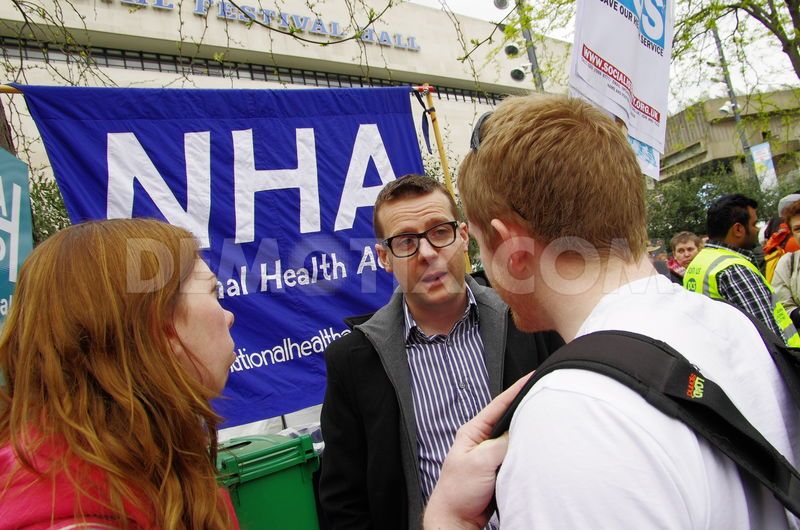 David Cameron blatantly lied to the country over NHS privatisation, says the co-leader of the National Health Action Party on the eve of his protest marathon to the Tory party conference.
David Cameron blatantly lied to the country over NHS privatisation, says the co-leader of the National Health Action Party on the eve of his protest marathon to the Tory party conference.
Dr Clive Peedell, who’s running 42 miles on Sunday morning from the HQ of NHS England in Leeds to Manchester, says there’s incontrovertible evidence that the Coalition is privatising the NHS – despite repeated claims by the Conservatives and Liberal Democrats that their NHS reforms would not lead to increasing privatisation.
Dr Peedell, the co-chair of the NHS Consultants Association also insists that privatisation of the NHS is a false economy as it is both expensive and inefficient.
In an article for Open Democracy, Dr Peedell demonstrates there is clear evidence that:
The Health and Social Care Act clearly fulfils all the commonly accepted criteria for healthcare privatisation, proving the Prime Minister has clearly misled the public, or in common language – lied.
He goes on:
If the public knew the full implications of what this would actually mean for the NHS, potential support for private provision of NHS services would plummet.
Dr Peedell argues forcefully against the assertion that it doesn’t matter who provides the service as long it’s free.
Privatisation needs a market… Market systems drain billions of pounds from the NHS budget and away from frontline care, by the creation of a huge bureaucracy of commercial contracts, accounting, legal challenges, advertising and billing.
He points out that administration costs of the NHS soared from 5% to 14% of total budget when Margaret Thatcher introduced the NHS internal market in 1991; this, he says, will increase further as “the current system is even more complex, bureaucratic and costly with three levels of bureaucracy replaced with seven”.
Dr Peedell explains that:
Private firms cherry pick the most profitable services… and leave local NHS Hospitals underfunded to pick up the pieces and deal with everything else they are expected to deal with – the full and comprehensive range of healthcare services to local communities.
And he warns that privatisation:
creates a vicious circle of increasing health care costs and financial pressure on the NHS. It leads to staff cuts, hospital and ward closures, increased waiting lists, and fewer core services provided by the NHS.
He explains how staff transfers from NHS hospitals to private hospitals (which don’t train their own staff) take vital expertise out of the NHS and how “patients have different parts of their care performed in different hospitals depending on the contracts that CCGs have signed up to. Quality is put at risk, expertise diluted, and costs driven up.”
He predicts that a failing NHS will only help boost private healthcare insurance for those that can afford it, “signalling the death knell for a universal healthcare service, free at the point of use.”
And he attacks “the revolving doors culture between the private health firms, politicians, think tanks, and civil servants within the Department of Health”.
Dr Peedell also demonstrates how the economy is damaged by the use of the private sector in the NHS:
Since public funds are used to pay for private sector provision of NHS services, taxpayers’ money is going directly into the profits of multi-national private companies and their shareholders. It is diverted away from direct patient care, and also diverted outside of our economy. Many of these companies are also registered in offshore tax havens. Privatisation of the NHS is a false economy.
The @NHAParty “may have been influenced in its aims by activity over Twitter”
Here is the @SocialistHealth to keep up-to-date with all the news from the Socialist Health Association [correct as of this morning]:
- The importance of Twitter is explained in the introduction:
“Social media is distinguished from traditional broadcast and print media by its ‘user generated’ content – the people who read it are the ones writing it and commenting on it. A prominent social media outlet is Twitter, the global online micro-blogging social network that is accessed by millions of users every day. Twitter enables its members to post text-based messages of up to 140 characters about any topic. The short format of the message – or tweet – is the defining characteristic of the service. Twitter and other social media provide users with the opportunity to share opinions widely and to interact with and potentially influence key decision-makers. As Twitter has entered mainstream use, the hashtag appears to have come of age politically. Recent regime changes in Egypt and Libya have been labelled ‘Twitter revolutions’, whilst the re-election of Barack Obama in 2012 was termed the first ‘Twitter election’ [1]. Whilst these terms may overstate the actual role of Twitter, it hints at Twitter’s soaring popularity and potential importance.
Twitter has become a popular platform for scrutiny of the UK coalition Government’s reform of the English National Health Service (NHS) [2].”
The authors identified the importance of “re-tweets”:
“People disseminate information deemed important on Twitter through ‘retweets’. This is when someone chooses to repeat a tweet by someone else, usually because they think the content is significant enough to merit sharing further. Twitter is well suited to studying influence because the diffusion of ideas can be tagged and observed, allowing us to determine how effective different ‘messengers’ of information are [10] and [11].”
The “most influential Tweeters” appear to be based in London:
“Determining the characteristics of tweeters is dependent on what information users are willing to enter about themselves on their public profile. Looking at the 100 most influential tweeters measured by the T-index, 77 of the 100 identified themselves as being from the UK with 43 stating they were based in London. No tweeter in the Top 100 identified themselves as being from or based outside the UK.”
The authors make interesting observations on the”non-hierarchical nature of Twitter”:
“Twitter represents a genuinely diverse platform for discussing health reform. Previously doctors have often limited themselves to their own networks, such as doctors.net. Twitter allows conversations to take place between regular NHS workers and opinion leaders such as journal editors, journalists and royal college presidents. This non-hierarchical approach is attractive in allowing voices of the frontline to be heard in an unfiltered manner, however, it may also reflect the small number of people using the medium. If it becomes more populated and widely used, it is possible that this effect will be diluted.”
And, finally, the NHA Party may have been influential in affecting the Reforms:
“Although not captured in the time frame of this analysis, the subsequent development of the National Health Action party (@NHAParty), a single issue political party campaigning against the reforms, may have been influenced in its aims by activity over Twitter, and includes prominent tweeters among its founding members and campaigns extensively using social media [17].”
Rainbow coalition warns about section 75 NHS Regulations
The most unlikely “rainbow” Coalition of people has united against backdoor NHS privatisation by the Conservative Party.
On a day when Centrica/British Gas announced record profits, the issue came up again about how the business had made massive profits while putting its prices up, and how there was no real competition in this crowded, fragmented market of few suppliers. Such suppliers constitute an ‘oligopoly’ as the barriers-to-entry to competition are sufficiently high, meaning that the big players in it are able to return massive dividends year-on-year. (more…)
How the National Health Action Party have brought out the worst in Labour supporters for me over Eastleigh
As a Labour Party member, I am prone to be tribal without realising it. Whenever Danny Alexander or Simon Hughes blame Labour for the deficit, and blame Labour for all other woes, I tend to switch off, and put it down to LibDem tribalism. But this of course cuts both ways. Some Labour members, apart from those pursuing a ‘progressive left’ with groups such as Compass, for much of this parliament have embraced what can best be described as a ‘hate campaign’ against LibDem members. This is often justified by such individuals because the LibDems have ‘sold out’, voting on key legislation such as the NHS reforms, welfare reforms, legal aid, to name but a few.
We have a broken political system – it is probably likely that voters in Eastleigh will vote for the LibDems first, and the Tories second. This was never a seat which Labour hoped to win. Labour supporters, even in the wake of the Francis Report and the implementation of PFI (originally a John Major policy), have incessantly said ‘they invented the NHS’, despite the fact that a Liberal (William Beveridge) had a lot to do with it. It’s as if they wish to stand on a 1945 slate, not wishing to engage in any teamwork over how best to advance the NHS. It’s the ‘hands off our NHS’ approach which I found initially distasteful.
If Labour had the remotest chance of winning, I would understand. However, it’s the fact that some Labour members tweet and share an article on Labour List called, “The National Health Action Party must be strangled at birth” makes me realise how very unpleasant some people’s political views are (and they are within Labour), but unfortunately which are given a voice on the blogosphere. Advocates of this article establish that the NHA Party pose a threat to Labour, rather than NHA Party pose a threat to the Conservatives or Liberal Democrats, but surely if Labour were that robust about their own policy this would not be an issue?
Whenever I mention that I would rather have a NHA Party MP vote against the Coalition on health than a Tory MP or LibDem MP in a seat ‘safe for’ Tories and Liberal Democrats individually, all I ever get is a ‘non answer’. When the electorate return a Tory MP or LibDem MP, it will indeed be sad that ‘The Only Way is Eastleigh’ show is over, but we’ll have a MP who votes for the Coalition on the NHS. Further to that, the voters in Eastleigh will be none-the-wiser if their NHS services, for example A&E departments, are shut down in the Winchester/Eastleigh region.
Indeed, Labour members are right to praise Jamie Reed, Andrew Gwynne, Diane Abbott and Andy Burnham, but actions for me speak louder than words. Labour failed to stop the enactment of the Health and Social Care Act (2012), enabled by a BBC which refused to discuss it and the votes of Liberal Democrats. But actions are important. It is only a few weeks before the statutory instrument 157 becomes law, thrusting the NHS into the machinery of competition law, even though CCGs do not have the necessary legal expertise or resources. There’s nothing to stop the Labour team stating tomorrow that they oppose this statutory instrument which is the engine behind the outsourcing of the NHS, the precursor to a full-blown privatisation.
Labour, a party which I am actually a member of, has some members which offend me in terms of their political approach. Instead of concentrating on the issues, they wish to ‘strangle at birth’ a party which I agree with actually – on warning over the dangers and fallacy of the markets in our NHS.

